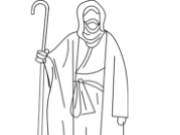God’s End-Time Servant Sets Israel’s Restoration in Motion
Many people who haven’t searched the scriptures for themselves for answers balk at the idea of an end-time servant. But have they considered why the Jews would be mistaken about Jesus or Christian ministers about Joseph Smith by whose comings God tested the people of their day?
Do they assume that preparations for Jesus’ advent will happen of themselves—that no prophet leader by the name of David will gather Israel’s twelve tribes, reconstitute God’s people amidst worldwide calamities, or that the temple to which Jesus comes will materialize on its own?
Have they taken into account that God has “hidden” his servant from the general knowledge of his people? Or that the house of Israel’s end-time restoration is still waiting to happen? Or that prophesied events of “the time of the restoration” are future (Doctrine & Covenants 77:15)?
Isaiah 49:1–2
Hear me, O isles; listen, you distant peoples:
Jehovah called me before I was in the belly;
before I was in my mother’s womb,
he mentioned me by name.
He has made my mouth like a sharp sword—
in the shadow of his hand he hid me.
He has made me into a polished arrow—
in his quiver he kept me secret.
If God “hid” his servant until the time he raises him up, that would seem a perfect occasion for God to divide his people based on who believes in his word and who doesn’t. If people haven’t searched the words of Isaiah, how shall they accept the additional records still to come forth?
3 Nephi 21:10–11
Behold, the life of my servant shall be in my hand; therefore they shall not hurt him, although he shall be marred because of them. Yet I will heal him, for I will show unto them that my wisdom is greater than the cunning of the devil. Therefore it shall come to pass that whosoever will not believe in my words, who am Jesus Christ, which the Father shall cause him to bring forth unto the Gentiles, and shall give unto him power that he shall bring them forth unto the Gentiles, (it shall be done even as Moses said) they shall be cut off from among my people who are of the covenant.
Jesus’ words on the large plates of Nephi (3 Nephi 26:1–11) will indeed separate out those who don’t believe them, who aren’t familiar with the words of Isaiah Jesus is here quoting. Isn’t a chief reason the gospel turns back to the house of Israel that in the end the Gentiles reject it?
Even Nephi, who was evidently forbidden to speak of God’s servant (1 Nephi 14:28), left us sufficient clues to figure out that he knew well Isaiah’s prophecies concerning him. Referring to the end-time, Nephi directs us to one of the codenames Isaiah uses of the servant—God’s “arm.”
1 Nephi 22:10–12; Isaiah 52:10
I would, my brethren, that ye should know that all the kindreds of the earth cannot be blessed unless he shall make bare his arm in the eyes of the nations. Wherefore, the Lord God will proceed to make bare his arm in the eyes of all the nations, in bringing about his covenants and his gospel unto those who are of the house of Israel. Wherefore, he will bring them again out of captivity, and they shall be gathered together to the lands of their inheritance; and they shall be brought out of obscurity and out of darkness.
As one of two “arms” of God in the Book of Isaiah—the arm of Righteousness and the arm of Salvation—God’s servant is empowered to perform his task of leading Israel’s end-time exodus out of Babylon in the pattern of Moses, who was appointed to lead Israel’s exodus out of Egypt.
Isaiah 51:9–11
Awake, arise; clothe yourself with power,
O arm of Jehovah!
Bestir yourself, as in ancient times,
as in generations of old.
Was it not you who carved up Rahab,
you who slew the dragon?
Was it not you who dried up the Sea,
the waters of the mighty deep,
and made of ocean depths a way
by which the redeemed might pass?
Let the ransomed of Jehovah return!
Let them come singing to Zion,
their heads crowned with everlasting joy;
let them obtain joy and gladness,
and sorrow and sighing flee away.
This passage even alludes to the idea that God’s end-time servant was that same angel who led the people of Israel through the Red Sea on dry land and their journeyings in the Sinai wilderness (Exodus 14:19; 23:20–23). What he performed as a spirit, therefore, he now does in the flesh.
Like Joshua, who led Israel’s conquest of the Promised Land, God’s servant reconquers the earth from the Assyrian alliance that overruns it. Just as God gave Enoch power over all his enemies, no earthly forces, military, political, or ecclesiastical, are able to withstand him (Moses 7:13).
Isaiah 41:2
Who has raised up Righteousness from the east,
calling him to [the place of] his foot?
Who has delivered nations to him,
toppled their rulers,
rendering them as dust to his sword,
as driven stubble to his bow?
Isaiah 41:25
I have raised up one from the north
who calls on my name,
who shall come from the direction of sunrise.
He shall come upon dignitaries as on mud,
tread them as clay like a potter.
As the mission of God’s servant is universal from the outset—encompassing “isles” and “distant peoples” (Isaiah 49:1)—he gathers the scattered tribes of the house of Israel and reconstitutes them as God’s covenant people. They are the nation “born in a day”—God’s Day of Judgment.
Isaiah 66:8
Can the earth labor but a day
and a nation be born at once?
For as soon as she was in labor,
Zion gave birth to her children.
Appointed by God as a “witness,” “prince,” and “lawgiver” to the nations, God’s servant David summons a new nation of the house of Israel. Like Moses—Israel’s lawgiver—he renews their covenant with God and prepares them for the coming of Jehovah/Jesus to reign on the earth.
Isaiah 55:3–5
Give ear and come unto me;
pay heed, that your souls may live!
And I will make with you an everlasting covenant:
[my] loving fidelity toward David.
See, I have appointed him as a witness to the nations,
a prince and lawgiver of the peoples.
You will summon a nation that you did not know;
a nation that did not know you will hasten to you—
because of Jehovah your God,
the Holy One of Israel, who gloriously endows you.
Like Moses, God’s servant delivers God’s people out of bondage and leads their wilderness wandering to promised lands. Like Joshua, he divides the inheritances of God’s people as they gather from dispersion. God’s re-creation of him on the spiritual level of a seraph empowers him.
Isaiah 49:8–10; 1 Nephi 21:8–10
I have created you and appointed you
to be a covenant of the people,
to restore the Land and reapportion the desolate estates,
to say to the captives, Come forth!
and to those in darkness, Show yourselves!
They shall feed along the way
and find pasture on all barren heights;
they shall not hunger or thirst,
nor be smitten by the heatwave or the sun:
he who has mercy on them will guide them;
he will lead them by springs of water.
Read More Key Book of Mormon Areas of Interest
Recommended Reading
& Listening
Avraham Gileadi, Isaiah Decoded: Ascending the Ladder to Heaven. The best all-time layman’s comprehensive overview of Isaiah’s prophetic message for Judeo-Christian readers based on the analysis of Hebrew literary patterns. Hebraeus Press, 2013: 357 pages. Softcover $27.95; E-Book $11.95; MP3 $11.95.











